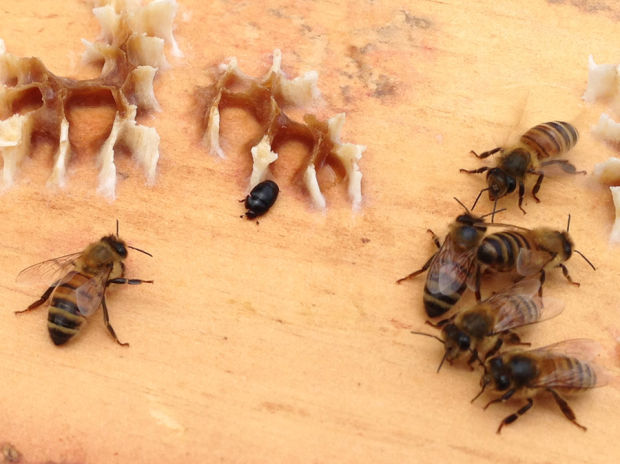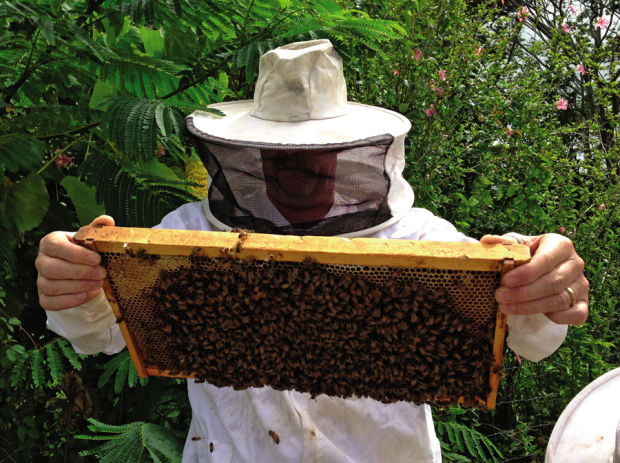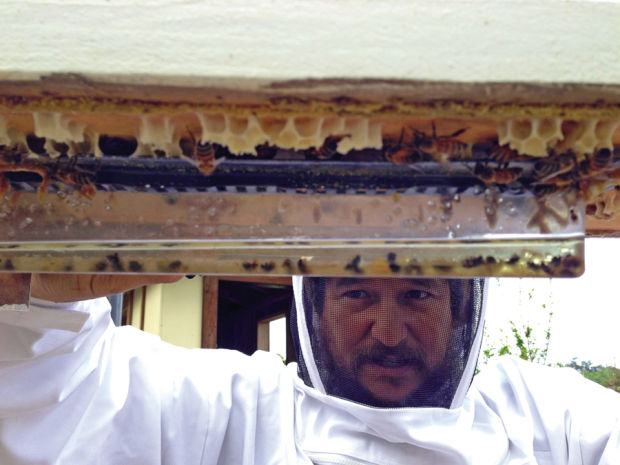LIHUE — The latest buzz from the Kauai Beekeepers Association is a plea to local government for more transparency and regulations on pesticide use.
“Out of concern for our environmental health, we the undersigned citizens petition Kauai’s legislators to enact rules and regulations to monitor and restrict the use of pesticides and herbicides,” states a KBA petition with more than 600 signatures.
One of the main goals is to protect local beehives from neonicotinoids, a powerful and widely used class of insecticides lethal to honey bees, according to KBA President Jimmy Trujillo
“It used to be a restricted pesticide,” said Trujillo, adding that in the past, the only people who were able to buy it were the ones who were licensed to spray.
“But now, because of the lax approach that the EPA took regarding safety standards, they approved it for regular domestic use,” he said. “It’s now available for unlicensed applications.”
Trujillo sent the petition to Mayor Bernard Carvalho Jr. and to Kauai County Council Chair Jay Furfaro two weeks ago.
Furfaro said he would be posting a communication in late July or August to discuss the effects of pesticides in bees. Pesticide regulations fall under the state’s jurisdiction, he said.
Carvalho said he is aware there are many concerns in the community regarding pesticide use, and he believes further discussion is warranted.
“Currently, pesticide use is regulated by the state, and I think the first step should be to determine if strengthening of that regulatory framework is necessary before creating another layer of regulation on the county level,” he said.
Councilman Gary Hooser is introducing a bill that addresses pesticides and genetically modified organisms. The bill is on the council’s agenda Wednesday for first reading.
“The focus of the ordinance is the right to know,” said Hooser, adding the public has the right to know what is being sprayed, and what the impacts are to their health and to the environment.
“Right now, that information is not available to the people of Kauai,” he said.
Trujillo’s worries, the same worries of many local beekeepers, are regarding neonicotinoids, which he said are used on Kauai by government workers, farmers and landscapers.
Neonicotinoids are a class of insecticides that affects the central nervous system of insects, causing paralysis and death, according to the federal Environmental Protection Agency.
Trujillo said neonicotinoids have been identified as one of the primary culprits for colony collapse disorder, a term that describes a phenomenon characterized by a quick loss of worker bee population from a colony.
He said House Bill 673, co-introduced earlier this year at the Legislature by Reps. Dee Morikawa and Derek Kawakami, originally addressed the issue in Hawaii by proposing full disclosure of pesticide use. But the bill’s final version was watered down, he said. Gov. Neil Abercrombie has yet to sign HB 673 into law.
“The pesticide registry bill was kind of a first crack,” said Trujillo, adding that it was about being able to know what is being sprayed, where, by who and when. “We know the Department of Transportation, Harbors, Parks, Public Works; these are all different users — it’s not just farm and ag and seed industry that are using these chemicals.”
Manageable disease
While most beekeepers across the state and on the Mainland were having nightmares of varroa mites and small hive beetles, Kauai honey producers for the most part have been stress free — until May 2012, when the first small hive beetles were confirmed on the island.
The small hive beetle was first detected on the Big Island in 2010, and from there it spread to Oahu, Maui and Molokai. Kauai and Maui are considered free of varroa mite, an external parasite that attacks honeybees.
Last year the Legislature appropriated funds for each county to fight honeybee diseases. Kauai was awarded $5,000, and in March, the Kauai Community College apiary program, where Trujillo teaches, received the funds.
Some of the beehives at KCC are infected with the small hive beetle, but the college is able to control the disease and produce honey. Trujillo said the state funds are being used to educate local beekeepers and to provide them with tools to keep the pest at bay.
If Kauai’s beehives ever get infested with the varroa mite, at least local beekeepers will be much more prepared to deal with the pest than other islands were, Trujillo said.
Jeff Becker, a third-generation honey producer from California, landed on Kauai last week for a short vacation. But his idea of vacation was spending time with Trujillo and his students at KCC’s apiary. While Becker’s wife was at a local resort sipping mai tais Tuesday afternoon, he was wearing a white beekeeper’s suit and checking KCC’s beehives.
“What do you expect? I’ve got honey running in my veins,” said Becker, adding that his family’s beekeeping business started almost 100 years ago by his grandfather.
Becker said the small hive beetle is a controllable disease. Though it affects many beekeepers on the Mainland, they are managing to get by and produce honey, he said.
• Léo Azambuja, staff writer, can be reached at 245-0452 or lazambuja@thegardenisland.com






